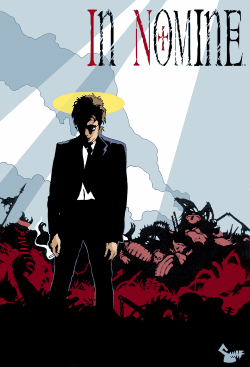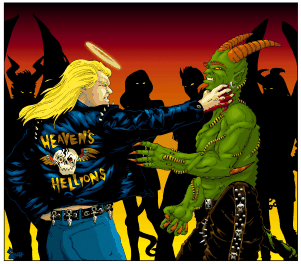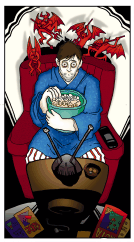Basically, it's the setting. The system isn't amazing; it's functional. The author went for a simple mechanic that suited the setting - you roll 3d6, with a 111 being good for Divine characters, and a 666 being good for Infernal characters. The first two d6 determine whether or not you succeed, and the final d6 determines the degree of your success or failure. It's fairly simple and easy to grasp. The dressing around this mechanic gets a bit fuzzy at times, like when applying damage or determining character benefits at creation (and character creation is spread over three chapters of the book, which I put down to sloppy editing).
However, it's the setting, and the tone of the book, that set it apart, and above, other games.
In Nomine is about the war between Heaven and Hell, with players portraying either Angels or Demons caught in this conflict. The tone of the book owes an incredible amount to Good Omens by Pratchett and Gaiman, and dark humour and pop references abound (see side bars about Angels and Soda Machines, and Demons and Backrubs).
As the setting allows demons to be played as sympathetic characters, angels to be portrayed as flawed and corrupt and the various superiors - both Archangel and Demon Prince - are flawed individuals with obvious character weaknesses, the book treads on thin ice, dealing with the largest religion in the western world.
To side step this, the author, Derek Pearcy, added an idiosyncratic and individual voice to the book which takes the edge off a lot of the content. Angels are bastards? Yeah, but it's funny. Demons could be the good guys? If they weren't so fucked up.
It's also worth stating that the angels are also the good guys, and the demons are still evil fucks. It's all a matter of perception.
At character creation, players choose two things:
- The type of angel or demon they want to play - A Seraphim or Cherubim, for example angels, or a Lilim or Djinn or Belseraph as example demons
- Which superior within Heaven or Hell their character reports to
Characters report into a predefined structure. They have a 'handler', usually an angel or demon with a Word (an aspect of creation that they have grown to champion and represent, like the Angel of Luck or the Demon of Pipe Bombs), who in turn reports into a Superior, an Archangel or Demon Prince with a really big word, like Michael, Archangel of War, or Vapula, Demon Prince of Technology).
The celestial hierarchy is laid out in detail, with space given to which of the Archangels and Demon Princes are aligned and opposed to each other, with overt hostilities existing between superiors within the same camps.
The setting has a strong focus on music. Creation is said to God's Symphony, and all angels are attuned to that symphony. They are individual instruments, organised into choirs (the Seraphim, for example, are a choir). Demons have opted out of the great work and instead have chosen to focus on their own, personal arrangements. Demons are grouped into bands, and care only about their own solos.
If a celestial being starts acting against their nature, they start to gain dissonance, which can lead to discord, which can be detected by any being able to perceive the symphony.
Magic, or miracles, are made possible by Songs - pieces of celestial music that achieve specific effects. Most angels and demons know a number of songs.
There are other options as well. Players can choose to play humans, either normal humans, or soldiers of Heaven or Hell or Sorcerers, who are humans who can perceive the symphony (although they call it the Cacophony, as they can't perceive the whole piece).
Alternately players can choose to play old gods from myth and legend, who live in the Marches, a shared dream space, and who have a distinctly different view on the world to Heaven and Hell.
It's the character of this game that really comes alive. The first supplement featured an adventure entitled The Demon Prince of Rock and Roll, which was about the Demon of Hardcore trying to elevate his status to that of a Demon Prince. In the game fiction, the narrative follows a demon servitor of Death, who has a zombie cat.
If I were to run a game of In Nomine again, it would be heavily inspired by Comfort Eagle, by Cake
EDIT: It occurs to me that I didn't go into what happened to this fine game. It is allegedly still supported by Steve Jackson Games, although is only available as a PDF from their online store. I think SJG kind of didn't know how to support In Nomine, and the later supplements lacked the irreverent humour and voice of Derek Pearcey, shifting focus from the games unique character to 'fixing' some of the system bugs, and dully expanding the game world.
I would agree that the system was laid out badly (I bought a second hand copy, which was helpfully embellished with yellow highlighter in the combat and character creation chapters, which lowered the price and increased the value - Win) and allowed certain anomalies to occur, but the way that later books blatantly slated sections of the core rules never sat well with me.
You can get more info on In Nomine at it's SJG website.




No comments:
Post a Comment